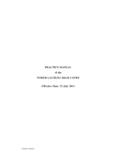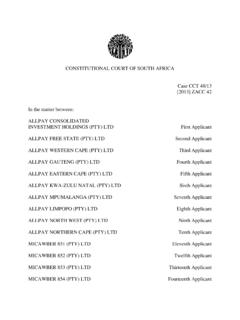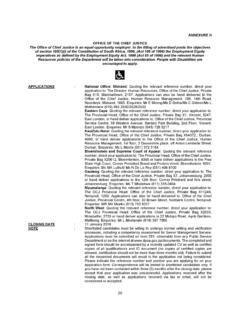Transcription of THE SUPREME COURT OF APPEAL OF SOUTH AFRICA …
1 THE SUPREME COURT OF APPEAL OF SOUTH AFRICA . JUDGMENT. REPORTABLE. Case No: 295/13. In the matter between: THE DIRECTOR OF PUBLIC PROSECUTIONS. north gauteng : PRETORIA APPELLANT. and SKHOSIPHI GCWALA FIRST RESPONDENT. ERIC THEMBA NTHOMBELA SECOND RESPONDENT. JOSIA NEO MOLOI THIRD REPONDENT. Neutral citation: DPP v Gcwala (295/13) [2014] ZASCA 44 (31 March 2014). Coram: Lewis, Shongwe and Saldulker JJA. Heard: 19 March 2014. Delivered: 31 March 2014. Summary: The period spent in custody by a prisoner awaiting trial is a factor to be taken into account in determining whether substantial and compelling circumstances exist such that a prescribed minimum sentence may be departed from. There is no rule as to how to determine what weight is to be given to that period. Each case must be decided having regard to all circumstances that justify a lesser sentence.
2 2. ORDER. On APPEAL from: north gauteng high COURT (Circuit Local Division for the Eastern Circuit District, Middelburg, Phatudi J sitting as COURT of first instance): 1 The APPEAL against sentence is upheld. 2 The order of the high COURT in respect of sentence is set aside and is replaced by the following: 1 The accused are sentenced to 20 years of imprisonment with effect from 30 June 2011. 2 The sentence currently being served by accused 2 is to run concurrently with the sentence now imposed.'. JUDGMENT. Lewis JA (Shongwe and Saldulker JJA concurring): [1] This is an APPEAL by the Director of Public Prosecutions, north gauteng , against sentences imposed by the north gauteng high COURT (Eastern Circuit District, Middleburg) on the three respondents. All three were charged with the murder of a Mrs Thandi Mtsweni. The State alleged that they had unlawfully and intentionally killed her on 27 June 2007 in the district of Leslie.
3 In the alternative, the respondents were charged with conspiring to murder the deceased. They were convicted on the charge of murder and the high COURT (Phatudi J) imposed an effective sentence of 12 years' imprisonment. I shall deal with the full sentence in due course since it is central to the APPEAL . The APPEAL lies at the instance of the 3. State, with the leave of this COURT , and is against sentence only. In giving leave to APPEAL this COURT required the State and the respondents to address a number of questions which I shall set out later. [2] The context in which the murder occurred is, of course, germane to the sentence. The deceased was the deputy mayor of the Govan Mbeki Municipality. The municipality had awarded a number of tenders to Ms Sibongile Florence Lukhele. The deceased cancelled some of these tenders. Ms Lukhele decided to arrange for her to be killed.
4 To this end she enlisted the help of a number of people, including one Mr Madoda Nkambule, who was referred to throughout the trial as Madoda, and who gave evidence in terms of s 204 of the Criminal Procedure Act 51. of 1977, on the basis that if he answered questions frankly and honestly he might be discharged from prosecution. Madoda agreed to execute Ms Lukhele's mandate for a fee of R60 000 and he in turn enlisted the aid of the three respondents. (In fact the high COURT did not discharge Madoda because he failed to answer questions frankly and honestly, but this is not an issue that arises in the APPEAL .). [3] The deceased, her husband and her son arrived at their home on 27 June 2007, and they alighted from their vehicle. As she went to open her front door she was shot several times, and died at the scene. Ms Lukhele was charged with murder together with the respondents.
5 However, she pleaded guilty to the charge and was thus tried separately. She was sentenced to 20 years' imprisonment. She agreed to give evidence at the respondents' trial and testified that she had conspired to murder the deceased, who had been her friend, with the mayor of the municipality, an officer of the SOUTH African Police Service and others. She explained the financial arrangements that she had made with Madoda. [4] Madoda in turn testified that he had approached the three respondents to kill the deceased. All three had attended a meeting at his house, and all three knew that they were mandated to kill the deceased for a fee. After the deceased had been shot they had informed Madoda that the mandate was accomplished. The fee was paid. The evidence that the three respondents were responsible for the killing of the deceased was corroborated by a number of other witnesses.
6 I shall not traverse it since the first two respondents did not APPEAL against conviction and the third respondent's application for leave to APPEAL against conviction was refused. Suffice it 4. to say that it was not clear which respondent actually shot the deceased. The third respondent claimed only to have driven the others to the deceased's house. The high COURT found that the evidence of Madoda, in so far as it was corroborated by police witnesses and circumstantial evidence, proved beyond reasonable doubt that the three respondents had a common purpose to murder the deceased. And as I. have said, there is no leave to APPEAL against their convictions. It should be noted, however, that the high COURT found all three respondents guilty of conspiracy to murder and murder as charged'. It did not take into account that the charge of conspiracy was an alternative to the charge of murder.
7 But in sentencing the respondents the COURT made it clear that there was only one sentence on one charge. [5] I turn then to the sentence. It read as follows: 1 I sentence you to 12 years of direct imprisonment. Two years of the period spent in custody while awaiting trial be deducted when calculating the date upon which the sentence is to expire for purposes of considering parole. 2 I further sentence you to 10 years of direct imprisonment, which sentence is wholly suspended for a period of 5 years on condition you are not found guilty of murder, attempted murder or conspiracy to murder during the period of suspension. 3 This applies only to accused 2: This sentence is to run concurrently with the sentence you are currently serving. [The second respondent was, at the time of the trial, serving a period of five years' imprisonment for a previous conviction.]
8 ]. You are all to serve an effective 12 years.'. [6] In determining the sentence the trial COURT took a number of factors into account: the murder was planned, and the respondents willingly agreed to kill a woman who was a dedicated member of the community in which she lived and worked. They spent time and travelled some distance (twice) to plan and commit the offence. They received VAT (sic) on the fee. The murder was politically motivated. Communities have been riddled with these offences of killing officers holding decisive positions in government especially those who refuse to subscribe to corruption '. 5. [7] But, said the COURT , the witness who testified on behalf of the community in which the deceased worked, Mrs Mtshweni, and who asked on behalf of the community that a sentence of life imprisonment be imposed, did not convince him: sentencing is aimed, said the COURT , at punishing the offender and not at vengeance.
9 Her evidence as to the ways in which the deceased's death had affected the community and the family was not considered any further. [8] The high COURT found that the following circumstances justified deviation from the prescribed period of life imprisonment for the murder of the deceased: 1 All three accused have been in custody for 4 years awaiting trial. 2 There is no evidence before me as to who shot the deceased. 3 Accused 1 and 3 are first offenders. 4 All three are candidates for rehabilitation.'. [9] The high COURT referred to S v Vilakazi 2009 (1) SACR 552 (SCA) para 15. which dealt with the proper approach to determining whether there are substantial and compelling circumstances that warrant a deviation from the minimum sentence prescribed by the Criminal Law Amendment Act 105 of 1997: there this COURT said that it is incumbent upon a COURT in every case, before it imposes a prescribed sentence, to assess, upon a consideration of all the circumstances of the particular case, whether the prescribed sentence is indeed proportionate to the particular offence'.
10 But for that, said the high COURT , it would have imposed life imprisonment. Nonetheless, it took the factors listed above as being sufficient to impose an effective sentence of 12 years' imprisonment instead of the sentence prescribed. [10] In refusing leave to APPEAL against sentence, the trial judge explained that he had taken the four years spent in custody by the respondents awaiting trial into account, and had, on the submission of defence counsel, doubled that number so that he deducted eight years from the sentence he would otherwise have imposed. The submission probably has its origin in S v Brophy & another 2007 (2) SACR 56. (W), where the COURT held that as a rule of thumb, imprisonment while awaiting trial is the equivalent of a sentence of twice that length' a quotation from a Canadian case, Gravino (70/71) 13 Crim LQ 434 (Quebec COURT of APPEAL ), cited also in S v Stephen & another 1994 (2) SACR 163 (W) at 168e-g.
















